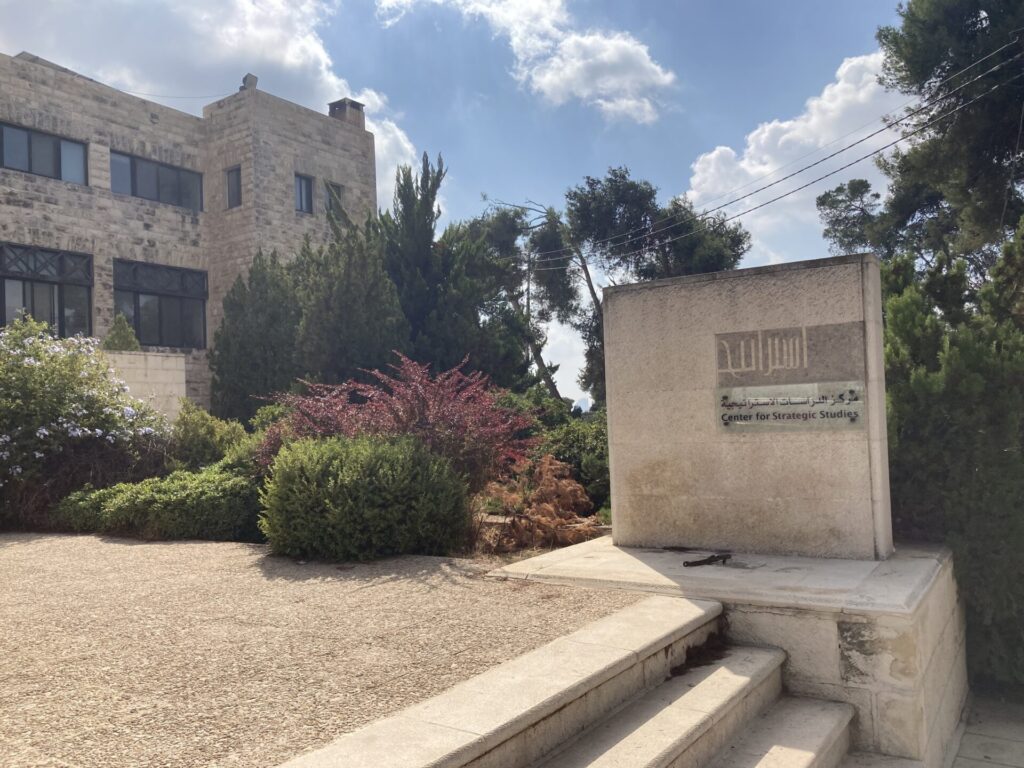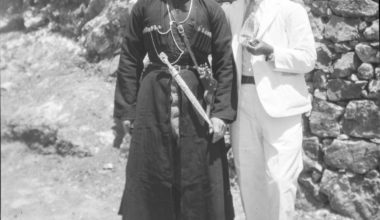By Lindsay Ward
I recently returned from Jordan after conducting the first phase of fieldwork research for my PhD. I fell in love with the region over thirty years ago and have relished the opportunity to return now as a mature Public Policy student based at the Department of Politics at Birkbeck College, University of London. This experience was enabled by a travel grant awarded by the Council for British Research in the Levant (CBRL), and I was lucky enough to benefit from additional research ideas shared with me by the Centre for Strategic Studies at the University of Jordan.

One stimulus for my research was that I was curious to find out how this ever-agile, stable country has responded to a recent and considerable policy challenge. Since the crisis began in neighbouring Syria, many Syrians have crossed the border. According to the Norwegian Refugee Council, 10.4% of the population are refugees, second only to Lebanon at 19.8%. These figures are staggering in themselves, but with scarce resources and rising unemployment, a rapidly increasing population continues to place major pressures on this desert country and its neighbours. By investigating the processes, the step-by-step decisions, which are shaping the policy response, I am uncovering an adaptive network of creativity where learning is the driving force behind innovative bespoke solutions with multiple gains.
The first major step was taken with the Jordan Compact in 2016. This ushered in a new era of policy making broadening the traditional outcomes to include development opportunities for young Jordanians and refugees alongside humanitarian relief. The Ministry for International Planning and Co-operation (MOPIC) produce the Jordan Response Plans (JRP) which map out the strategy and goals for this policy with adjustments every few years.
To focus my analysis, I have examined how this JRP has taken shape in the livelihood and education sectors. My document and media reviews show that while there were structural reforms to the labour market and educational provisions, domestic and international non-government organisations make the policy experience through their more localised delivery practice.
The Smart Desert Project for example, was established to improve the incomes of “Jordanian and Syrian beneficiaries throughout the year” in the North Eastern Highlands. Work, for example, focuses on reducing agricultural production costs through the encouragement of the use of solar power and new techniques which both aids food production in a region of scarce resources, whilst harnessing the assets of an abundant and green natural resource. Business Incubators provide farmers, homebased business owners and young budding entrepreneurs with technical, legal, and business support. SPARK Jordan, an international non-government organisation (INGO), provide “higher vocational educational opportunities” for Syrian and Jordanian young people and work to grow SMEs, the mainstay for the workforce to provide employment opportunities for the future. Meanwhile, the evolution of UNICEFs Makani project brings refugee and Jordanian children of all ages together to engage in informal educational activities where they can learn and understand each other in safe spaces.
As a former educator, I believe such exciting and worthwhile projects are indicative of a strong learning culture amongst those who are involved. The Public Policy discipline actually identifies learning as an influence on the shape of policy, but it is understudied in environments like Jordan and the Levantine region. Furthermore, policy learning is often regarded as a drawing of lessons or transfer of solutions from elsewhere.
Through semi-structured interviews and discussions in the Kingdom I have found convincing evidence to support my view of the significance of learning but by a much more organic process than existing notions would suggest. Policy makers create internal learning opportunities within their organisations, but they also learn from others, often through formal structures provided by MOPIC, the Jordan INGO Forum (JIF), and NGO Forum (JONAF) and International Organisations like UNHCR in a flexible learning web.
MOPIC is at the helm, a permanent more formal heart of the web. Beyond this are the NGOs who by their very character are more fluid organisations, and relatively temporary in the case of the INGOs. From this mid-level they link with partners for specific projects and engage directly and with beneficiaries to understand needs. There is a real and palpable determination to succeed well. The JIF actually lists learning as one of its aims and together with JONAF produces Walk the Talk which is a collaborative evaluation which feeds back into the policy process. In this way policy makers are interpretative learners and do not seek to impose ready-made projects on the local populations. Policy is created in the art of looking and learning and the result is bespoke responses to meet identified needs in an appropriate way.
It is my intention to return to Jordan to build on my interviews and to gather more data from observations. I am grateful for my recent experiences of being able to share this research with the Centre for Lebanese Studies. I aim to visit Lebanon, which faces similar challenges, to conduct a smaller intensive study to see if my findings apply. By understanding how this learning emerges, we can discover a great deal about the policy systems in which the learning takes place. When complete, my study will shed light on good policy making which is assisting populations who are in need. It will show the adaptive policy making processes which other policy makers facing similar challenges can study.
About the author
 Lindsay is a Public Policy specialist with a track record in public sector leadership up to senior level. Her professional experience includes senior roles in multi award winning local government and front-line politics and governance in the NHS and NGO sector. She combines this with up-to-date research skills recognised in her Master of Research in Public Policy and Management which she is now applying to the study for a PhD.
Lindsay is a Public Policy specialist with a track record in public sector leadership up to senior level. Her professional experience includes senior roles in multi award winning local government and front-line politics and governance in the NHS and NGO sector. She combines this with up-to-date research skills recognised in her Master of Research in Public Policy and Management which she is now applying to the study for a PhD.
The views expressed by our authors on the CBRL blog are not necessarily endorsed by CBRL but are commended as contributing to public debate.














